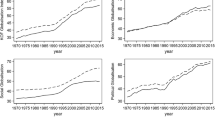Abstract
In his elegant book Douglas Allen claims that an improvement in the measurement of Nature made for lower transaction costs and the Industrial Revolution. His argument is a typical example of neo-institutionalism in the style of Douglass North (1990) and North et al. (2009). A fall in a wedge of inefficiency is supposed to provide Good Incentives, and the modern world. But the elimination of wedges lead merely to Harberger Triangles of improved efficiency—not to the factor of 100 in properly measured real income per head, which is the Great Enrichment 1800 to the present to be explained. Allen does yeoman work in explaining some of the peculiarities of British public administration, such as the reliance on aristocratic honor and on the prize system in naval warfare. But he attributes to public administration an implausible effect on private incomes. The merging of power and plenty is mistaken. Further, the alleged increase in a modern ability to measure marginal products is implausible. Large modern enterprises face greater, not smaller, problems of assessing the contribution of individuals. Allen’s book on measurement does not measure, and the probable order of magnitude of the items he focuses on is too small to explain any but the details of administration.
Similar content being viewed by others
References
Acemoglu, D., & Robinson, J. A. (2012). Why nations fail: The origins of power, prosperity, and poverty. New York: Crown Books.
Allen, R. C. (2009). The British industrial revolution in global perspective. Cambridge: Cambridge University Press.
Broadberry, S. N., & Bishnupriya, G. (2005). The early modern price divergence: Wages, prices and economic development in Europe and Asia, 1500–1800. CERP discussion paper 4947. London: Centre for Economic Policy Research.
Goldstone, J. A. (2002). Efflorescences and economic growth in world history: rethinking the ‘rise of the West’ and the industrial revolution. Journal World History, 13, 323–389.
Greenfeld, L. (2001). The spirit of capitalism: Nationalism and economic growth. Cambridge: Harvard University Press.
Jones, E. L. (1988). Growth recurring: Economic change in world history. Oxford: Clarendon.
Jones, E. L. (2010). Locating the industrial revolution: Inducement and response. London: World Scientific.
Kirzner, I. M. (1976). Equilibrium vs. market processes. In E. Dolan (Ed.), The foundations of modern Austrian economics. Kansas: Sheed and Ward.
Klamer, A., & McCloskey, D. N. (1995). One quarter of GDP is persuasion. American Economic Review, 85(2), 191–195.
McCloskey, D. N. (1991). Economic science: a search through the hyperspace of assumptions? Methodus, 3(1), 6–16.
McCloskey, D. N. (2001). Women’s work in the market. In I. Zweiniger-Bargielowska (Ed.), Women in Twentieth-Century Britain: Economic, social, and cultural change (pp. 1900–2000). London: Longmans.
McCloskey, D. N. (1994). Knowledge and persuasion in economics. Cambridge: Cambridge University Press.
Mokyr, J. (2009). Intellectual property rights, the industrial revolution, and the beginnings of modern economic growth. American Economic Review, 99(May), 349–355.
North, D. C. (1990). Institutions, institutional change and economic performance. Cambridge: Cambridge University Press.
North, D. C. (2005). Understanding the process of economic change. Princeton: Princeton University Press.
North, D. C., Wallis, J. J., & Weingast, B. R. (2009). Violence and social orders: A conceptual framework for interpreting recorded human history. Cambridge: Cambridge University Press.
North, D. C., & Thomas, R. P. (1973). The rise of the western world: A new economic history. Cambridge: Cambridge University Press.
Ó Gráda, C. (2009). Famine: A short history. Princeton: Princeton University Press.
O’Brien, P. K (2011). The contributions of warfare with revolutionary and Napoleonic France to The Consolidation and Progress of the British Industrial Revolution. Department of Economic History, London School of Economics Working Papers No. 150/11
Parthasarathi, P. (2011). Why Europe grew rich and Asia did not. Cambridge: Cambridge University Press.
van Zanden, J. L. (2004). The skill premium and the ‘great divergence.’ http://www.iisg.nl/hpw/papers/vanzanden.pdf
van Zanden, J. L. (2009). The long road to the industrial revolution: The European economy in a global perspective, 1000–1800. Leiden: Brill.
Author information
Authors and Affiliations
Corresponding author
Rights and permissions
About this article
Cite this article
McCloskey, D.N. A neo-institutionalism of measurement, without measurement: A comment on Douglas Allen’s The Institutional Revolution . Rev Austrian Econ 26, 363–373 (2013). https://doi.org/10.1007/s11138-013-0236-6
Published:
Issue Date:
DOI: https://doi.org/10.1007/s11138-013-0236-6




